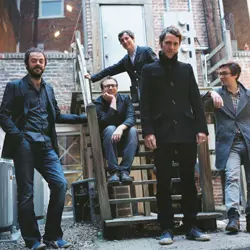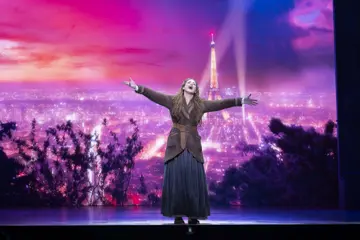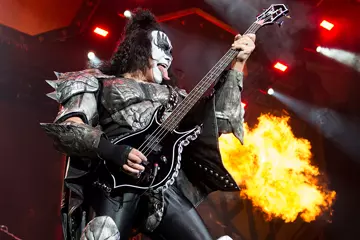 Gomez
GomezGomez play Splendour In The Grass at the Belongil Fields in Byron Bay on Saturday.
Lots has been written about Gomez. Let's see: eclectic, eccentric, erratic, enthralling, entertaining, effervescent... and that's just the letter E. Notably, they write quite brilliant songs, are celebrating their third album, In Our Gun, in four years and remain the darlings of just about any music journo who cares to slam down a few words about this quintet of relative youngsters.
Their career began meteorically. In 1996, they were a gang of friends from north-west Britain, fresh out of Sheffield University and sharing a house in the upmarket Yorkshire town of Ilkley, where they began taping the jam sessions they held in their garage on a four-track cassette recorder. Singer/guitarist Ian Ball handed a tape to local record store owner, Steve Fellows, who unbeknown to the band used to be a member of 80s cult outfit Comsat Angels. He still had contacts in the industry and within weeks was fielding offers from more than 30 UK labels, all of whom were invited to a special Gomez show in October 1997. Hut (distributed through Virgin) won the deal and those initial songs became the core of the band's first album, Bring It On. It sold half a million copies and ultimately won the prestigious Mercury Music Award for Best Album in 1998 as the band also picked up Best New Band gongs from both Q and NME that year.
Bring It On was an astonishing fresh-faced debut that maybe best termed blues-thrash-flavoured space jazz and rock, although really it's a lot more than that. Their second album Liquid Skin was similarly kaleidoscopic; fatter, part psychedelic, sometimes grungy. A little bit fuzzy with a touch of folk and some urban blues. In Our Gun is something else again; gone are the lengthy explorations and jams. In their place, electronic samples, atmospheres, a conciseness and an extended commitment to be as diverse as possible. One moment it thunders, the next it hisses and writhes like an angry snake, before dropping into dub reggae and emerging with a doleful acoustic lament. It's outrageous and it's clever.
"That's what we work at. That's the main thing. That's what excites us about music - the possibilities within it. The thing I'm most happy about, three albums down the track, is that we can still make records that sound good but are exciting and different. We haven't got stuck in a rut. Our ambition is just to make great records, put on good live shows and enjoy it. In many ways people do consider us unambitious because we don't want to be the biggest band in the world or anything like that. I've no kind of pretentions to that kind of shit. You have to write boring songs to be that anyway. That isn't our scene."
Don't miss a beat with our FREE daily newsletter
Along the way they have been compared to an astonishing breadth of bands: Captain Beefheart, The Beatles, The Beta Band, Belle & Sebastian, Ozric Tentacles, Phish, Kyuss, Nick Drake. More than anything it's a reflex reaction to their experimentation.
"The Ozric Tentacles! That's hilarious," Ottewell laughs. "There's a few good bands in that list but really all the comparisons are funny. It does have its positive side though because you get to hear of bands like say Little Feat who we hadn't heard of really. Someone said we were ripping them off so we thought well let's listen to them they might be pretty good."
And they are. Ottewell agrees as the conversation switches to old glories.
"I saw Neil Young at a festival recently. He was brilliant. His guitar playing was superb. He had Donald 'Duck' Dunn and Booker T because he played a lot of the new stuff from Are You Passionate. To be honest that was a bit naff but the rest of it was great."
Ottewell's greatest influence as musician isn't a band though. It's his dad who exposed his son to a broad sweep of music including Young, Dylan, The Grateful Dead, Hendrix, The Beatles, The Band, Miles Davis, Thelonius Monk.
"The thing about those influences, even though we are very eclectic, is that they aren't as direct as one would imagine. We always find questions about influences hard because when you are writing or arranging a song, I think a lot of people imagine that it's like 'let's put a bit of jazz there or a bit of blues there'. But it isn't like that all. You just play what feels right. It's not a direct thing. The great thing about the band is that as much as we surprise other people we probably surprise each other more."
Bring it on.
















